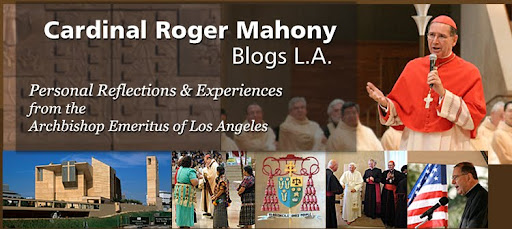The Los Angeles City Council has voted to increase the minimum wage in the City to $15 per hour by the year 2020. Thirty years ago when I first became Archbishop of Los Angeles, I would never have thought it necessary to take such an enormous leap in low-end worker salaries.
Not any more.
There are many reasons for the hike, but two of them are really important:
1. In past years, minimum wage jobs were also relatively short-term jobs. They were meant for young people working part-time or others just entering the job market. No one expected such jobs to be long-term and permanent work. These jobs were to get a foothold in the work field, and then to move on to better middle class jobs.
2. The number of next level, middle class, jobs across southern California have all but disappeared. Recall after the Second World War how our area became a great leader in aerospace and defense companies. Hundreds of thousands of people were employed in these good paying, middle class jobs over the years. But gradually, because of many factors, those companies and those jobs began to disappear.
The result? People desperate to provide for their families are increasingly stuck in low-paying jobs, most paying at or below minimum wage. This is particularly true for our immigrant brothers and sisters. There are no "better jobs" to move on to.
And it's not just the wages. Minimum wage jobs almost never offer benefits such as health care, retirement plans, or other amenities from previous generations. Many companies limit the hours for such employees in order to avoid having to pay for medical insurance. Shifting schedules makes it difficult for such workers to get to other low-wage jobs, or to take some classes.
Another worrying result is the rapid expansion of low-income families, and increasing wealth of high-income families, and the narrowing group in the middle.
The real issue is not just about minimum wage jobs. Rather, our goal must be to look for ways to narrow this growing gap between people at the top and those at the bottom.
The gap is not only economic. In so many places across the country, it is also a racial divide. Studies show that the minority communities of our country consistently remain on the lower rung of the economic ladder. Both divides need our focused attention, and I hope that the 2016 Presidential candidates will engage our country in this discussion--and that they be required to lay out concrete plans to ease the divide and to provide greater economic opportunity for everyone.
Just a few areas might help move us in the right direction. Home ownership has always been a past measure of success for our families. We need to make home ownership more readily available to all of our people--through new qualification parameters, lower down payments, and other means that do not jeopardize either the families or the economy.
Most lower paying jobs offer no pension plan opportunities. Even if companies offered a very simple plan these families could begin acquiring some equity for the future.
Social Security could raise the cap on payroll taxes so that the more affluent can contribute their fair share into the plan which will benefit them.
The City of Los Angeles plan will go a long way to help our poorer families. But all of the incorporated cities in Los Angeles County need to match this new increase in the minimum wage for it to have its full effect. If a company in Los Angeles City just moves a few miles to a small city with a lower minimum wage, then everyone loses.
The widening gap between those at the higher end of our economy and those at the lower end of our economy must return to its former, historic narrow range.
Thursday, May 21, 2015
Subscribe to:
Posts (Atom)


